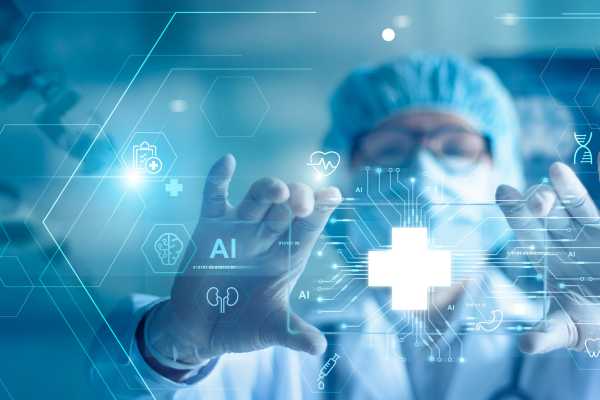5 Key Ways AI Is Improving the Future of Health Care

Purdue Global
Since its inception in the 1950s, artificial intelligence (AI) has moved from a futuristic concept to a daily tool in the lives of millions. Its capabilities are impressive, particularly in health care, where its impact could be profound. As we witness AI’s rapid advancement, it’s crucial to explore its potential to improve health outcomes.
Exactly what role does AI play in the future of health care? We asked Purdue Global faculty Ginger Cameron, PhD, faculty in the School of Health Sciences; Zeynep Behjet, MD, program chair of health informatics and digital health programs; and Stefanie Jones, DHA, department of health care administration chair, to weigh in on this pivotal topic.
1. Better Ability to Spot Disease Outbreaks
AI already has the ability to detect disease outbreaks long before we have identified them. According to MIT Technology Review, BlueDot, an AI firm, detected an uptick in pneumonia cases in Wuhan, China on December 30, 2019. They promptly alerted clients, including governments and hospitals. This alert came 9 days before the World Health Organization recognized the emergence of COVID-19. HealthMap at Boston Children’s Hospital and Metabiota, another AI company, also identified the anomaly.
“We have been using computers and automated systems to monitor disease and health for many years,” says Cameron. “AI has brought an added level of sophistication to that and has the potential to improve early warning and detection systems that can save lives.”
2. Improved Resource Management for Hospitals
The early detection capabilities of AI extend beyond outbreak alerts to resource management within hospitals.
The MIT Technology Review article referenced earlier also suggests that integrating diagnostic data with logistics management can “improve forecasting and better service levels” for health care supply chains.
This predictive approach allows hospitals to prepare and respond more effectively to patient needs, ensuring that the right resources are available at the right time. By anticipating demand surges and streamlining supply requisitions, AI systems help mitigate shortages and reduce waste, contributing to a more resilient health care infrastructure.
3. Advancements in Imaging and Diagnostics Technology
AI is also transforming the field of medical imaging and diagnostics. The U.S. National Library of Medicine (NLM) reports that AI enhances the detection of abnormalities in imaging technologies like CT scans, MRIs, and ultrasounds. The NLM states that “AI methods excel at automatically recognizing complex patterns in imaging data and providing quantitative, rather than qualitative, assessments.”
While assessing medical images has always fallen under the purview of trained physicians, AI can be used as a tool within the clinical workflow. Leveraging AI in this way provides more accurate and reproducible radiological assessments. This means that diseases such as cancer, heart disease, and arthritis can be identified more swiftly and accurately, leading to potential earlier interventions and improved patient outcomes.
4. Increased Ability to Assign Risk Levels to Patients
Risk stratification is a methodical approach to categorizing patients based on their health status. AI is already helping to improve this process.
“AI plays a significant role in risk stratification by leveraging data-driven insights to identify individuals at different levels of risk for various health conditions,” Behjet says. “AI offers the potential for early disease diagnosis, precise genomic analysis, reliable risk assessment, personalized treatment recommendations, and remote patient monitoring.”
The benefits extend past expanding the technological capabilities.
“AI promises to not only enhance patient care but also reduce costs and significantly improve health outcomes in the coming decade,” Behjet says.
5. Better Remote Patient Screening
The application of AI in remote patient monitoring is rapidly growing and is currently projected to grow to $4.3 billion by 2027, according to BCC Research. AI facilitates the use of at-home screening devices that monitor vital signs, enhancing patient access to health care. This also allows health care organizations to optimize operations while giving patients access to advanced care, even if they are in rural, underserved areas.
“The use of AI in health care results in greater convenience for patients who can be monitored remotely, rather than in-person at health care facilities,” says Jones. “Monitoring data can be used to inform patient and provider decisions.”
In addition to early disease detection and intervention, Jones believes AI will bring us “improved organizational efficiency, which allows providers to focus on more acute patients and complex cases in acute care settings.”
Master of Health Informatics: At the Intersection of Technology and Health Care
AI-driven innovations are not only streamlining health care delivery but also opening doors to more proactive and personalized patient care. As AI continues to evolve, it promises to be an indispensable ally in the pursuit of better health outcomes. Reaching that promising future requires dedication and educated professionals who understand how to bridge the gap between technology and health care.
If you’re drawn to this field, earning a graduate degree in health informatics may be right for you. Explore the online master of health informatics or reach out today for more information.
